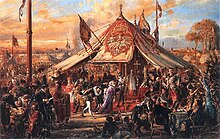Free choice (Poland-Lithuania)
The election of the king or grand duke from 1573 to 1791 in Poland-Lithuania by the nobility as a whole is referred to as free choice (Polish: wolna elekcja ) .
history
The nobility has long considered the right to choose a king as their greatest privilege. At the time of the Jagiellonian kings , this right was more of a theoretical nature.
It only became of practical importance after the death of the last male Jagiellonian Zygmunt II August . Quite apart from the fact that initially there was uncertainty about the possible candidates, there were no concrete arrangements as to how an election should take place. In the following times of Interregna , the procedure for the free election of a king developed, which ultimately formed the central basis of the Polish-Lithuanian aristocratic republic until its end.
Until the interregnum of 1572/73, the magnates or the Sejm appeared as voters . In January 1573, a convocation rich day took place in Warsaw . There Jan Zamoyski essentially asserted that all nobles personally ( viritim ) had the right to take part in the election of a king on the election fields in Kamion and Wola near Warsaw. They all had one vote, so that in principle the small nobility was on an equal footing with the magnates. From then on, this privilege was defended against all opposing tendencies by the nobility as the “eyeballs of freedom” (Latin “Pupillae libertatis”, Polish “źrenice wolności”).
On the election day in April 1573, 50,000 nobles were present. You could choose between five candidates. While the great magnates were in favor of a Habsburg archduke, the rest of the nobility preferred Henri de Valois , brother of Charles IX. of France . The latter was also chosen. In order to bind the king who came from abroad to the existing rights and privileges, the Reichstag decided on the Articuli Henriciani , which the king had to swear. In addition, there was a specific catalog of demands in the form of the pacta conventa , which the king had to implement during his reign. Should the king break the agreement, the nobility reserved the right to resist. After the forced deposition of King Henri (1574/75), each king had to recognize both documents after his election.
Free choice in the individual years
literature
- Manfred Alexander : Small history of Poland . Federal Agency for Civic Education, Bonn 2005, ISBN 3-89331-662-0 , pp. 89, 91, 108f
